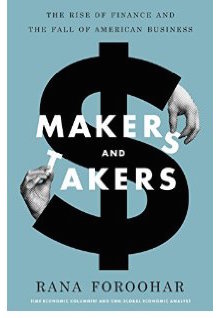

Foroohar is an assistant managing editor at TIME and the magazine’s economics columnist. She’s the author of Makers and Takers: The Rise of Finance and the Fall of American Business.
In an opinion piece today in the Wall Street Journal, Harvard Business School dean Nitin Nohria took issue with the core premise of my new book, Makers and Takers: The Rise of Finance and the Fall of American Business: that as finance has nearly quadrupled in size as a percentage of the U.S. economy over the last several decades, economic growth has slowed. Nohria argues that “Wall Street remains a fundamentally value-creating enterprise.” To a large degree, the statistics simply don’t back him up.
Since the financial sector began to ascend in the 1980s, the number of financial crises (the biggest destroyer of prosperity after wars and natural disasters) have increased, and overall trend growth has slowed. As I explained in my recent Time cover story, deep academic research shows that the growth in size and power of the financial sector in America has coincided with a decline in many metrics of business health, from research and development spending to the number of new start-ups being created.
But what’s most interesting to me about Dean Nohria’s argument is that he seems to be saying that Wall Street is good because it lends money to real businesses, unlike the financial system of the India of his youth. Just the opposite is true. Studies have shown that only about 15% of the money sloshing around American financial institutions ends up in business investment–the rest is invested in existing assets like stocks, bonds and homes, often creating the sort of market bubbles that we’ve seen explode so dramatically in the last decade. (For more research on this topic, see this seminal study by Schularick, Taylor and Jorda as well as Adair Turner’s book Between Debt and the Devil.)
If we still had a system that operated in the straightforward way that Dean Nohria describes, it would surely be a boon for the American economy. Sadly, we don’t. Thanks to a fundamental business model shift from lending to trading, our financial system today enriches mainly itself, creating only 4 % of all jobs but taking 25% of corporate profits.
As for his point about how its wrong to criticize MBA students for heading to Wall Street rather than industry, it’s certainly true that you can’t blame them. Given the tens, or even hundreds of thousands of dollars of debt that students today graduate with, many of them are forced to just go where the big bucks are. And as I illustrate above, that’s still Wall Street more than any other industry.
What’s interesting in that many academics, including several at Harvard, have criticized the curriculum that teaches financial engineering over the real kind. (See this fascinating book on the topic by Harvard professor Rakesh Khurana.) Many CEOs themselves feel that today’s MBA students are taught to think about the balance sheet before anything else, including workers, customers or their own longer term corporate prosperity. As Aetna CEO Mark Bertolini said to me, “Business schools are still teaching that you should run your company the way people did decades ago: marshal your capital and treat labor like an expendable cost. But the world has completely changed. We’re awash in capital, but there’s a shortage of skilled labor out there. Business schools are still using the same old teaching models, in a world that’s so complex, it can’t be modeled.”
What’s more, the problem of financialization isn’t limited to the U.S. The IMF recently published a paper noting that many emerging market countries are beginning to suffer from the tell-tale signs of too much finance. Countries like India and China may be the next theatres for financialization.
Let me be clear, while bankers themselves take a lot of flack (some unfair, some not) for all of this, the shift that I’m describing in my book is really about 40 years of small policy changes that have created the wrong incentives for both financiers and CEOs. Washington is the ultimate arbiter of what happens on Wall Street and that’s why it’s crucial that the next President pay attention to the fact that finance has become a headwind to business, rather than a helpmeet (I offer several possible solutions in the last chapter of my book).
What we need isn’t a financial system that’s bigger. What we need is a financial system whose primary function is to support real Main Street business. Sadly in the US, and in a growing number of other countries, that’s not at all what we have.
More Must-Reads From TIME
- The 100 Most Influential People of 2024
- Coco Gauff Is Playing for Herself Now
- Scenes From Pro-Palestinian Encampments Across U.S. Universities
- 6 Compliments That Land Every Time
- If You're Dating Right Now , You're Brave: Column
- The AI That Could Heal a Divided Internet
- Fallout Is a Brilliant Model for the Future of Video Game Adaptations
- Want Weekly Recs on What to Watch, Read, and More? Sign Up for Worth Your Time
Contact us at letters@time.com